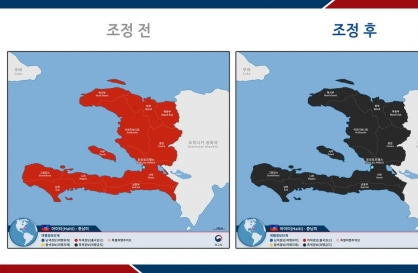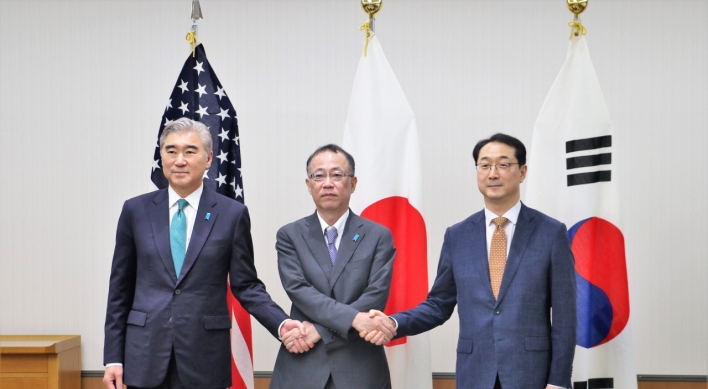[Herald Interview] US expert urges bigger role for China in NK response
By Yoon Min-sikPublished : Sept. 11, 2016 - 16:54
North Korea’s fifth nuclear test on Friday put China and its decades-old ties with the hermit kingdom to the test, amid growing accusations Beijing is not doing enough to curb Pyongyang’s nuclear and ballistic missile programs.
Douglas H. Paal, vice president for studies at international think tank Carnegie Endowment for International Peace, stressed the importance of China’s role in thwarting the North’s nuclear ambitions. He said China holds the key to engaging with the reclusive country, which has grown more belligerent under youthful leader Kim Jong-un.
Douglas H. Paal, vice president for studies at international think tank Carnegie Endowment for International Peace, stressed the importance of China’s role in thwarting the North’s nuclear ambitions. He said China holds the key to engaging with the reclusive country, which has grown more belligerent under youthful leader Kim Jong-un.

“China is the party that prevents us from placing the kind of (economic) sanctions on North Korea that we had on Iran or other successfully sanctioned states. ... It shifts the focus of the question to ‘what do we (South Korea and the US) need to do to bring China to bring enough pressure on North Korea to change the equation?’” Paal told The Korea Herald, during an interview held prior to Friday’s test.
He said one big factor is how tolerable the North’s “nuclear state” claim is to China. During the ruling party convention in May, Pyongyang officially stated it has become a nuclear-armed state.
“China has been unwilling to put enough pressure on (Pyongyang) to change the status quo and take the risk of a regime collapse,” said Paal, formerly a director of Asian Affairs for US presidents Ronald Reagan and George H.W. Bush from 1986- 1993.
“There may need to be more deterioration in their (Chinese) relations to Pyongyang, before they understand that continued attachment to Pyongyang is more damaging to China’s interest than the change in status of the North Korean government.”
Such deterioration may be imminent in the wake of Friday’s experiment, as the Chinese Foreign Ministry speedily issued a statement reaffirming its “resolute opposition” to Pyongyang’s nuclear program.
Paal said the allies’ leadership should engage the Chinese to assure a regime change in the North would not inflict damage upon its strategic interests.
He said one big factor is how tolerable the North’s “nuclear state” claim is to China. During the ruling party convention in May, Pyongyang officially stated it has become a nuclear-armed state.
“China has been unwilling to put enough pressure on (Pyongyang) to change the status quo and take the risk of a regime collapse,” said Paal, formerly a director of Asian Affairs for US presidents Ronald Reagan and George H.W. Bush from 1986- 1993.
“There may need to be more deterioration in their (Chinese) relations to Pyongyang, before they understand that continued attachment to Pyongyang is more damaging to China’s interest than the change in status of the North Korean government.”
Such deterioration may be imminent in the wake of Friday’s experiment, as the Chinese Foreign Ministry speedily issued a statement reaffirming its “resolute opposition” to Pyongyang’s nuclear program.
Paal said the allies’ leadership should engage the Chinese to assure a regime change in the North would not inflict damage upon its strategic interests.

“The answer to that question is conversation between the leadership of the US and China, reassuring Beijing that change in North Korea would not be exploited to China’s disadvantage,” Paal said.
The North’s latest nuclear test, in violation of the UN Security Council resolution, represented yet another dilemma for China over its opposition of the allies deploying the US Terminal High Altitude Area Defense system here.
While China has feverishly opposed the deployment, experts here have said that the nuclear test may back the logic behind the stationing of the advanced missile defense system.
On the upcoming deployment of the THAAD system, Paal said China has essentially “taken a political response” to the issue by viewing it as representing the integration of an anti-China coalition.
The deployment of the THAAD system -- slated for next year -- has sparked disputes about South Korea being incorporated into the US-led joint missile defense system in the region.
This has been further fueled by talks about South Korea and Japan potentially sealing a general security of military information agreement, on which the Seoul government has been reluctant to reveal its official position.
Defense Minister Han Min-koo, as well as Director James D. Syring of the US Missile Defense Agency, has denied that THAAD in Korea will be part of a wider missile defense network.
Paal described it as “an incipient security dilemma” developing in the peninsula, where South Korea’s means of self-defense has caused China to think they are being threatened by the American missile system.
He pointed out that leaders of Seoul and Washington have made it clear that the weapon system will not be used against China, and that its X-band radar -- which allies have said will be operated in a range-limited “terminal mode” -- can see very little into China.
“But we can’t overwhelm China’s nuclear capabilities, China has too many missiles. THAAD has a very limited capability against a very limited threat: against North Korea,” he said.
“The notion that this (THAAD) somehow affects China’s strategic interest, to me, is just far-fetched. We need to have time to discuss this subject, rather than to be driven by imaginary concerns or theoretical concerns,” Paal said.
The fundamental solution to the problem, he stressed, is to focus on dealing with the North Korea nuclear issue, which is the source of the problem.
With the political environment expected to undergo a major shift in South Korea, the US and China this year and the next -- between the presidential elections in Washington and Seoul, along with the Communist Party congress in Beijing -- Paal said that proposals for engaging the North will likely come up in 2018, when the political landscape has settled.
While there have been concerns the North’s arsenal could grow by that time, Paal pointed out that while Pyongyang is definitely moving up the ladder in a technology standpoint, it is constrained by industrial capacity.
As efforts for diplomacy continues, he said there must be changes in Kim Jong-un’s mindset before there can be a feasible solution to North Korea’s nuclear situation.
China’s actions are the crucial element in that equation, he stressed.
“We do that with paths through Beijing -- not only through it, but the very important path is through Beijing.”
By Yoon Min-sik(minsikyoon@heraldcorp.com)
The North’s latest nuclear test, in violation of the UN Security Council resolution, represented yet another dilemma for China over its opposition of the allies deploying the US Terminal High Altitude Area Defense system here.
While China has feverishly opposed the deployment, experts here have said that the nuclear test may back the logic behind the stationing of the advanced missile defense system.
On the upcoming deployment of the THAAD system, Paal said China has essentially “taken a political response” to the issue by viewing it as representing the integration of an anti-China coalition.
The deployment of the THAAD system -- slated for next year -- has sparked disputes about South Korea being incorporated into the US-led joint missile defense system in the region.
This has been further fueled by talks about South Korea and Japan potentially sealing a general security of military information agreement, on which the Seoul government has been reluctant to reveal its official position.
Defense Minister Han Min-koo, as well as Director James D. Syring of the US Missile Defense Agency, has denied that THAAD in Korea will be part of a wider missile defense network.
Paal described it as “an incipient security dilemma” developing in the peninsula, where South Korea’s means of self-defense has caused China to think they are being threatened by the American missile system.
He pointed out that leaders of Seoul and Washington have made it clear that the weapon system will not be used against China, and that its X-band radar -- which allies have said will be operated in a range-limited “terminal mode” -- can see very little into China.
“But we can’t overwhelm China’s nuclear capabilities, China has too many missiles. THAAD has a very limited capability against a very limited threat: against North Korea,” he said.
“The notion that this (THAAD) somehow affects China’s strategic interest, to me, is just far-fetched. We need to have time to discuss this subject, rather than to be driven by imaginary concerns or theoretical concerns,” Paal said.
The fundamental solution to the problem, he stressed, is to focus on dealing with the North Korea nuclear issue, which is the source of the problem.
With the political environment expected to undergo a major shift in South Korea, the US and China this year and the next -- between the presidential elections in Washington and Seoul, along with the Communist Party congress in Beijing -- Paal said that proposals for engaging the North will likely come up in 2018, when the political landscape has settled.
While there have been concerns the North’s arsenal could grow by that time, Paal pointed out that while Pyongyang is definitely moving up the ladder in a technology standpoint, it is constrained by industrial capacity.
As efforts for diplomacy continues, he said there must be changes in Kim Jong-un’s mindset before there can be a feasible solution to North Korea’s nuclear situation.
China’s actions are the crucial element in that equation, he stressed.
“We do that with paths through Beijing -- not only through it, but the very important path is through Beijing.”
By Yoon Min-sik(minsikyoon@heraldcorp.com)











![[New faces of Assembly] Architect behind ‘audacious initiative’ believes in denuclearized North Korea](http://res.heraldm.com/phpwas/restmb_idxmake.php?idx=644&simg=/content/image/2024/05/01/20240501050627_0.jpg&u=20240501225745)







